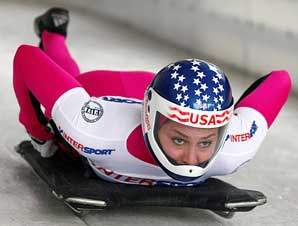
Vancouver Games skeleton preview
Your face is an inch off the ice and your life is passing before you. The sled is so small, you may as well be caroming down on your bare stomach. You may be able to duck behind your driver in a bobsled -- or let your feet do the steering on the luge -- but your life passes before your eyes on the skeleton.
Even though her best results may be behind her, nobody has overcome more to be at these Games than Noelle Pikus-Pace, the U.S. slider who suffered a horrifying leg injury five years ago in Calgary when a bobsled kept going past the finish and slid into her while Pikus-Pace was at the far end of the track. Pikus-Pace had been a strong contender for Olympic gold in Turin, but she broke both her tibia and fibula in her right leg. She made a valiant comeback, but still failed to qualify for the U.S. team. Instead of sulking, she dedicated herself to making one more run at an Olympics and living a dynamic life. She won a world title, got her masters degree and became a first-time mother. In Vancouver, she will have a chance to compete at an Olympics for the first time.
Until Jan. 15, the top finish for the U.S. in skeleton this season had been fifth. But Eric Bernotas broke through the mire, winning a race in St. Moritz. At 38, Bernotas has gained more than frequent-flier miles and medals from his sporting life. He suffered from Tourette's syndrome and, during his days as a student at West Virginia University, battled depression and alcoholism. He credits the confidence he gained from his success on the ice for enabling him to overcome his demons. Historically, the U.S. has had success in skelton. In 2002, when the sport returned to the Olympic program after a 54-year hiatus, Jimmy Shea and Tristan Gale both won gold medals.
Germany's Marion Trott is the reigning world champion, but Canada's Mellisa Hollingsworth is carrying her host nation's hopes with her to Vancouver. Hollingsworth, the reigning Olympic bronze medalist, grew up in a small town in Alberta where her first sporting love was rodeo. She would race her horse around barrels, so she has gone from a large ride to a small one. Trott is a converted luger who had never won a World Cup race until she captured her first one last season on the Olympic track in Whistler.
Skeleton athletes have straps at their sides they hold onto during the race. Though technique is very intricate for advanced sliders, beginners are often told to look into the turn, so their shoulders angle themselves at the proper tilt. One other bit of useful advice: Don't instinctively put you hands in front of you to try to slow yourself down, otherwise the blades will run over your hands and leave your fingers somewhere on turn seven.
Feb. 19 (for men and women)




